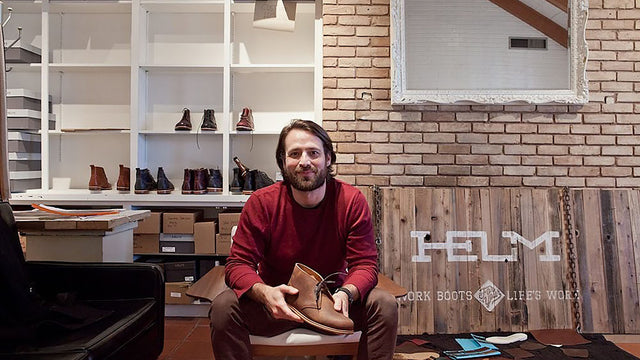Joshua Bingaman
They say you can tell a lot about a man by his shoes—and if that statement rings true, there’s no denying Joshua Bingaman has a keen eye for detail, a passion for getting involved in his community and cares deeply about nurturing his personal and professional relationships. His line of HELM Boots are known not only for being skillfully handcrafted with the finest materials possible, but also convey a refined nod to timeless, rugged style. Bingaman’s footwear is designed with heart—made to pass down from generation to generation—just as his father handed down his prized Irish setter boots to him.
Not your typical guy’s guy with a handsomely bearded face, Bingaman exemplifies the qualities of a well-rounded fellow: he’s a musician, designer, entrepreneur and family man. He’s built houses in Honduras, was a special-needs teacher, and is an advocate for supporting all things locally made. He’s built a career based on his passion to connect with others, and a desire to provide quality goods—leading to his success with HELM Boots.

Bingaman’s love for shoes dates as far back as childhood, sporting old school Nikes, Pumas and (in the key of Run-DMC) “My A-di-das”—evolving later to hiking boots as a teen. Both Bingaman and his brother developed a mutual obsession with everything from Vasque hiking boots to cowboy boots. Their shoe addiction prompted them to open the Subterranean Shoe Room together in 2004 doubling as an art gallery in San Francisco’s eclectic Mission District. He recalls, “opening Subterranean gave us a crash course in the shoe biz, and it really blew up!”
The success of the small business inspired Bingaman to explore a new venture with a similar organic mom and pop vibe—in coffee roasting. He sold his half of the boutique to his brother, and embarked on a bold move to Austin, TX opening a one-of-a-kind café known as Progress Coffee.
Progress Coffee serves fair trade, organic coffee that caters well to the Austinian palette. Under Bingaman’s guidance, the café showcased some of Austin’s best artwork, hosting an array of music and art events that later influenced Austin’s Eastside development. Progress expanded out two more cafes in Austin, and although they were thriving, Bingaman felt a nostalgic calling back to the world of footwear. He noticed an undiscovered niche in the category and began simultaneously designing what would become HELM Boots while running the cafes. “I began to wonder why I couldn’t have a workboot that is versatile enough to wear with a suit, that would serve as a hybrid of a boot and shoe,” he says. After ten years, he sold Progress in 2013 to pursue his HELM dream full-time.

With the amount of TLC that goes into each pair of boots, it’s no surprise how quickly HELM took off. Every pair is artfully cut by hand and undergoes a rigorous setting and shaping process, followed by a wear test before they can even be sold. His leather works of art have attracted an impressive list of clients; from Robert Plant, Terrell Owens, Robert Downey Jr to Atoms for Peace. Not to mention HELM was a finalist in Martha Stewart’s “American Made” Awards last year.
Bingaman takes great pride in his team and the relocation of HELM production to the USA last year—Maine to be exact. The people around him mean a lot. He states, “no matter how ‘big’ this company gets, if there’s not a caring and positive family-like relationship among the staff, then we’re not successful. It’s not just about the money made, it’s about the relationships and everyone involved—people first, product next, then profit. That is true success.”
Aside from running his labor of love at HELM, Bingaman is a father of three and proudly admits his kids get most of his quality time. Bingaman also still enjoys roasting a good cup of joe, and a good book. (Although one would wonder when he ever finds the time?)

Bingaman’s personal style incorporates classic heritage. “The most important thing to me (even now when I wear sneakers) is having an emotional feel with what I’m wearing—and where it’s made. Currently I have on some old L.L. Bean boots, old jeans and a pea-coat that’s older than me. My shoe collection has stuff that my dad could have worn, but works today. I appreciate the nostalgic connection.”
As genuine Bingaman is about his career and lifestyle it also translates to his view on growing a beard. “Some guys may not have one after the ‘supposed’ trend is over, but I will. It’s just a part of who I am—plus my wife doesn’t like me without it,” he laughs. Bingaman keeps his beard routine low maintenance and admits, “I use a beard trimmer every two weeks to run it over my beard, and I shave the neck and cheeks once or twice a week. It’s got to be simple and easy, otherwise what’s the point?”
He also confesses to only shaving it off twice in the last dozen years—once as a casualty to a lost bet. “I make crazy stupid bets here in Austin with a few of my buddies, being that I grew up in Oklahoma. There is a huge rivalry here between Oklahoma University and the University of Texas. This particular bet my beard was down to my chest, and the winner got to shave the loser’s head and beard at the local barbershop. Unfortunately I lost, and to add insult to injury, it made the local paper.”
Bingaman may not always make the wisest bets, but he does indeed prove you can tell a lot about a man by his shoes. With a heart and so(u)le of gold, he’s the definition of a
